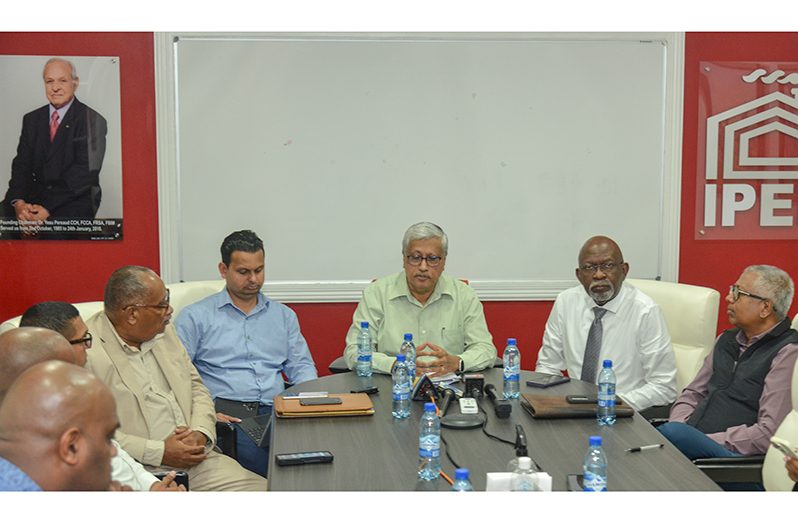–DDL Chairman says, as company’s milk products rejected by Trinidad & Tobago
–Guyanese President/current CARICOM Chairman engaged on matter
WHILE many Caribbean leaders have agreed that there needs to be concrete efforts in promoting trade, especially when it comes to advancing the regional food-security goals, trade barriers are still a bugbear to free trade among the Caribbean Community (CARICOM) Member States.
In this case, Trinidad and Tobago has come under fire for rejecting a milk shipment from Guyana.
Chairman of the Demerara Distillers Limited (DDL) Group, Komal Samaroo, during an abrupt press conference on Tuesday afternoon, expressed frustration at the situation which raises the questions as to how serious the region is about advancing its food-security goals.
While stressing that this is a matter of public interest, the DDL Chairman said: “You cannot be promoting trade on an uneven playing field, where you have free, ready access, but nobody has access to your market. That cannot work.”
According to Samaroo, DDL exported to Trinidad and Tobago during the month of March, four 20ft shipping containers containing a quantity of its packaged milk and bottled flavoured water based on an evaluation of the Trinidad Market by a Trinidadian business enterprise, which determined a desire for these products by the Trinidadian consumers.
However, the two containers of packaged milk products valued at US$100,000 were denied entry and returned to Guyana, while the bottled water products have been restricted from sale pending the completion of an “unconventionally exhaustive” examination of these bottled water products.
On Monday, DDL engaged with a team from Trinidad and Tobago’s Ministry of Trade to discuss the rejection of their milk exports.
Samaroo noted that they were advised of an extremely “onerous and stringent process” for the importation of Animal and Animal based products based on provisions of Trinidad and Tobago’s Animal Disease and Importation Act 2020.
“DDL find these requirements contrary to the spirit of intra-regional trade especially since we are reliably informed that Guyana has no such reciprocal requirements for the importation of similar products from Trinidad and Tobago. DDL, therefore, requests that the Government of Guyana take note of these developments and seek to ensure that there is balance and equity in our trade relations with Trinidad and Tobago,” Samaroo said.
Reflecting on the chain of events that led to the return of the milk products, he said on April 19, they were advised that the milk was not approved for entry into Trinidad by its Ministry of Agriculture, as “Guyana is not an approved country for importation of animal and animal products.”
Further, the Chairman noted that DDL has exported to a few other CARICOM states and they have never encountered a problem like the one in Trinidad and Tobago.
He noted that all requirements were followed by his company and they are even approved by the US Food and Drugs Administration.
Additionally, Guyanese President, Dr Irfaan Ali, who is also the current Chair of CARICOM, has been engaged on this matter, as the Chairman of DDL plans to pursue this matter “as far as necessary” even if it means to the Caribbean Court of Justice (CCJ).
Notably, despite many discussions to address it, Guyanese businesses have continuously face the age-old issue of exporting or transshipping honey products to Trinidad and Tobago.
The non-conformity of Trinidad and Tobago’s legislation governing the importation or transiting of honey has been a long-standing issue continuously raised before the Council for Trade and Economic Development (COTED).
Trinidad and Tobago’s honey, bees and bee products are guided by the island’s age-old Food and Drug Act of 1960 and Beekeeping and Bee products Act of 1935.
Both of these, however, are not in keeping with the Revised Treaty of Chaguaramas (RTC) as highlighted by COTED and has led to the total prohibition of honey from other countries to the island.
In 2012, a portion of Grenada’s honey was confiscated, while a US$3,000 fine was imposed on Guyanese company Laparkan in 2015 for coming within one mile of the island’s shores.
COTED has since stipulated that Trinidad and Tobago’s legislation be amended to provide for the trade in honey from its fellow member states, however the conditions have not changed.



.jpg)








